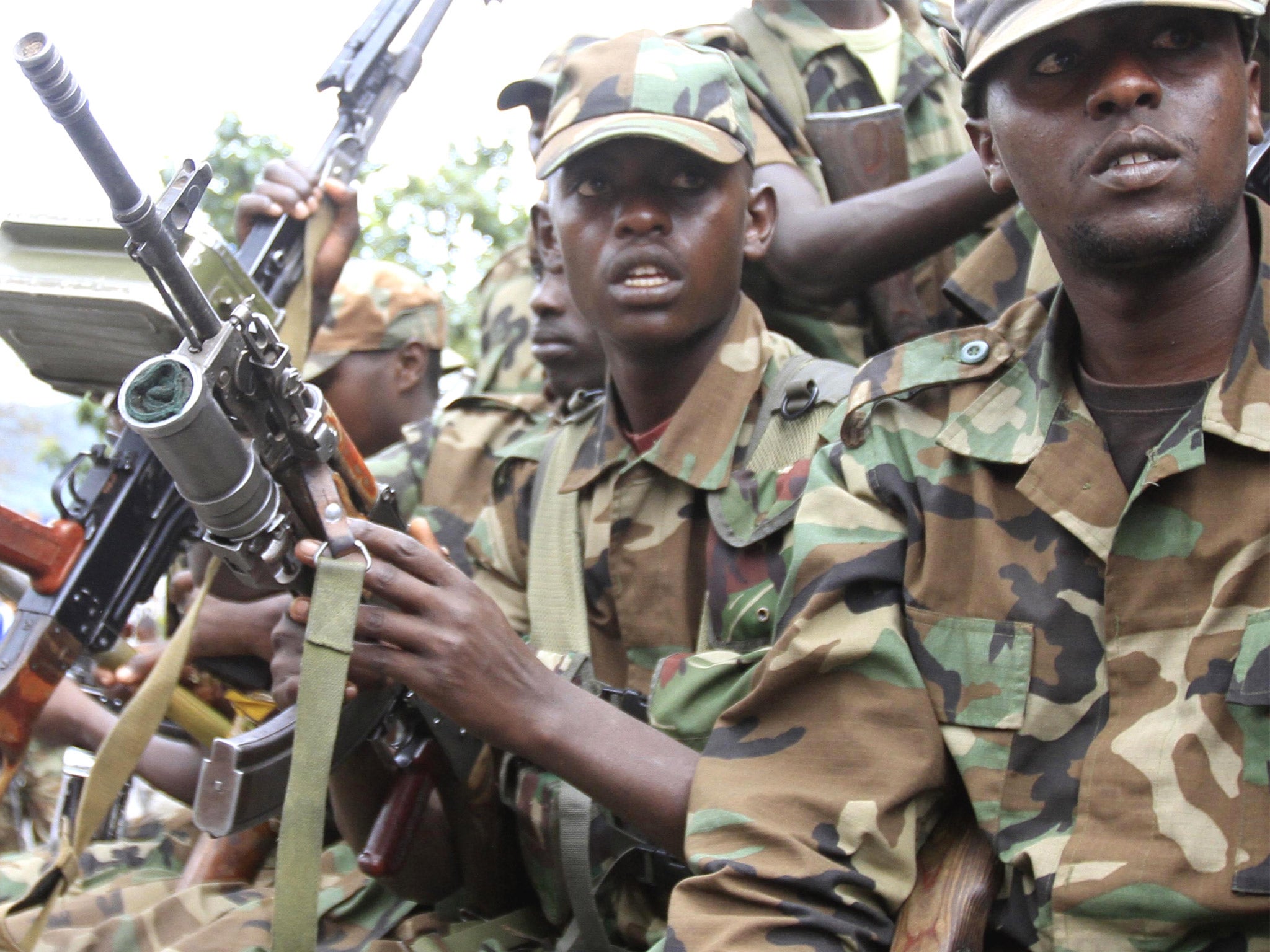Rwanda's invading army
The M23 rebels are on the march, capturing a key Congolese city after overrunning UN troops. But who is really backing them?

Your support helps us to tell the story
From reproductive rights to climate change to Big Tech, The Independent is on the ground when the story is developing. Whether it's investigating the financials of Elon Musk's pro-Trump PAC or producing our latest documentary, 'The A Word', which shines a light on the American women fighting for reproductive rights, we know how important it is to parse out the facts from the messaging.
At such a critical moment in US history, we need reporters on the ground. Your donation allows us to keep sending journalists to speak to both sides of the story.
The Independent is trusted by Americans across the entire political spectrum. And unlike many other quality news outlets, we choose not to lock Americans out of our reporting and analysis with paywalls. We believe quality journalism should be available to everyone, paid for by those who can afford it.
Your support makes all the difference.Rebels widely believed to have links to Rwanda have overrun UN peacekeepers to seize control of the strategically important eastern Congo city of Goma, leading experts to warn that the conflict could spill over into a wider regional war.
After three days of intense fighting, the Congolese army fled the city and UN forces stood aside to let rebels from the M23 group march into Goma.
The rebels, who a UN panel of experts say have been supported by Rwanda and to a lesser extent Uganda, said they will now push further into the Democratic Republic of Congo.
The M23 advance has already emptied one of the largest refugee camps on the outskirts of the ramshackle city sending some 60,000 people fleeing south. Aid workers and non-essential UN staff have also been evacuated.
Yesterday morning, the sound of heavy weapons and machine guns reverberated through Goma’s pot-holed streets and slums. Some residents ran for the border crossing into Rwanda and Goma’s twin city of Gisenyi. By the afternoon several hundred fighters from M23 – a force estimated to be 1,500-strong – marched through the main avenue with a handful of people waving or cheering their arrival. Most residents hid indoors.
The troops walked past the armoured personnel carriers of the 1,400 UN soldiers who failed to defend the city despite days of insisting they would do so. The notoriously incompetent Congolese army had already fled, with some units stopping to loot before departing.
“There is no army left in the town, not a soul,” an unnamed official with the UN force, known as Monusco, told Reuters. “Once they were in the town what could we do? It could have been very serious for the population.”
DR Congo has been shattered by two previous conflicts known as the “Africa’s World War” that are estimated to have killed more than four million people. The International Crisis Group (ICG) warned last night that urgent steps must be taken to avoid the “real possibility” of a wider war: “Regional and international actors must now prevent this turning into a new regional war,” the ICG said in a statement.
“The past week has shown history repeating itself in eastern DRC, with the same tragic consequences for civilians in the region.”
In the space of seven months the M23 rebellion – started by soldiers mutinying over what they claim is the government’s reneging on a peace deal signed on 23 March, 2009 – has defeated the numerically superior army and humiliated Monusco with its 6,700-strong force deployed in the province of North Kivu. The rebels have been accused of mass rape, recruiting child soldiers and massacring civilians.
The Tutsi-led M23 force is the reincarnation of the CNDP rebels who routed Congolese government troops and the UN in 2008 but stopped at the gates of Goma. Four years ago Rwanda intervened to roll back the rebellion on condition that its army was allowed to cross the border and pursue ethnic Hutu militia, the FDLR.
The CNDP fighters and many of their commanders were then given senior posts in the Congolese army, while its leader, the warlord Laurent Nkunda went into exile in Rwanda.
Talks to resolve the present crisis are underway in the capital of neighbouring Uganda, Kampala. However, the Congolese Information Minister, Lambert Mende, ruled out negotiations with the rebels, saying they were Rwandan proxies and they would only speak with the government in Kigali.
Prospects for a peace deal are complicated by a UN experts’ report due to be published this week which details financial, military and logistical support from Rwanda and Uganda for the M23. Despite overwhelming evidence in the report, seen by The Independent, Rwanda and Uganda both deny involvement.
These denials have lost credibility as independent reporters, UN troops and aid workers have witnessed Rwandan soldiers fighting alongside the rebels in recent weeks. Any response from the UN Security Council will also be hobbled by the fact that Rwanda was elected to serve on the council last month.
Jason Stearns, an expert on the Great Lakes region said the rebels’ aims remain enigmatic: “The M23 strategy could well be more to nettle the government, underscore its ineptitude, and hope that it will collapse from within.”
Who's who: The fighting factions
M23 Congolese rebels allied to Rwanda and named after 23 March 2009 peace deal that disbanded their predecessors, the CNDP.
FDLR Remnants of Hutu milita from Rwanda, the force has relied on the control of mines.
FARDC The Congolese army has earned a reputation for rape, looting and extortion as well as cowardice.
RDF The Rwandan army has allegedly participated in M23 rebel attacks and regularly invaded DR Congo since the genocide in 1994.
Join our commenting forum
Join thought-provoking conversations, follow other Independent readers and see their replies
Comments